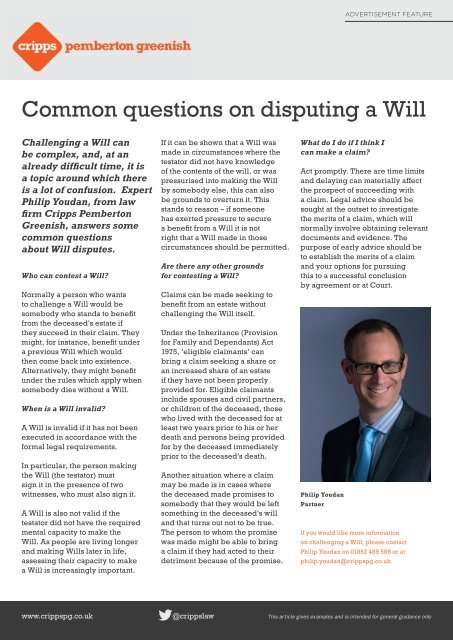Wealden Times | WT217 | March 2020 | Good Living supplement inside
Wealden Times - The lifestyle magazine for the Weald
Wealden Times - The lifestyle magazine for the Weald
Create successful ePaper yourself
Turn your PDF publications into a flip-book with our unique Google optimized e-Paper software.
ADVERTISEMENT FEATURE<br />
Common questions on disputing a Will<br />
Challenging a Will can<br />
be complex, and, at an<br />
already difficult time, it is<br />
a topic around which there<br />
is a lot of confusion. Expert<br />
Philip Youdan, from law<br />
firm Cripps Pemberton<br />
Greenish, answers some<br />
common questions<br />
about Will disputes.<br />
Who can contest a Will?<br />
Normally a person who wants<br />
to challenge a Will would be<br />
somebody who stands to benefit<br />
from the deceased’s estate if<br />
they succeed in their claim. They<br />
might, for instance, benefit under<br />
a previous Will which would<br />
then come back into existence.<br />
Alternatively, they might benefit<br />
under the rules which apply when<br />
somebody dies without a Will.<br />
When is a Will invalid?<br />
A Will is invalid if it has not been<br />
executed in accordance with the<br />
formal legal requirements.<br />
In particular, the person making<br />
the Will (the testator) must<br />
sign it in the presence of two<br />
witnesses, who must also sign it.<br />
A Will is also not valid if the<br />
testator did not have the required<br />
mental capacity to make the<br />
Will. As people are living longer<br />
and making Wills later in life,<br />
assessing their capacity to make<br />
a Will is increasingly important.<br />
If it can be shown that a Will was<br />
made in circumstances where the<br />
testator did not have knowledge<br />
of the contents of the will, or was<br />
pressurised into making the Will<br />
by somebody else, this can also<br />
be grounds to overturn it. This<br />
stands to reason – if someone<br />
has exerted pressure to secure<br />
a benefit from a Will it is not<br />
right that a Will made in those<br />
circumstances should be permitted.<br />
Are there any other grounds<br />
for contesting a Will?<br />
Claims can be made seeking to<br />
benefit from an estate without<br />
challenging the Will itself.<br />
Under the Inheritance (Provision<br />
for Family and Dependants) Act<br />
1975, ‘eligible claimants’ can<br />
bring a claim seeking a share or<br />
an increased share of an estate<br />
if they have not been properly<br />
provided for. Eligible claimants<br />
include spouses and civil partners,<br />
or children of the deceased, those<br />
who lived with the deceased for at<br />
least two years prior to his or her<br />
death and persons being provided<br />
for by the deceased immediately<br />
prior to the deceased’s death.<br />
Another situation where a claim<br />
may be made is in cases where<br />
the deceased made promises to<br />
somebody that they would be left<br />
something in the deceased’s will<br />
and that turns out not to be true.<br />
The person to whom the promise<br />
was made might be able to bring<br />
a claim if they had acted to their<br />
detriment because of the promise.<br />
What do I do if I think I<br />
can make a claim?<br />
Act promptly. There are time limits<br />
and delaying can materially affect<br />
the prospect of succeeding with<br />
a claim. Legal advice should be<br />
sought at the outset to investigate<br />
the merits of a claim, which will<br />
normally involve obtaining relevant<br />
documents and evidence. The<br />
purpose of early advice should be<br />
to establish the merits of a claim<br />
and your options for pursuing<br />
this to a successful conclusion<br />
by agreement or at Court.<br />
Philip Youdan<br />
Partner<br />
If you would like more information<br />
on challenging a Will, please contact<br />
Philip Youdan on 01892 489 588 or at<br />
philip.youdan@crippspg.co.uk.<br />
www.crippspg.co.uk @crippslaw This article gives examples and is intended for general guidance only


















